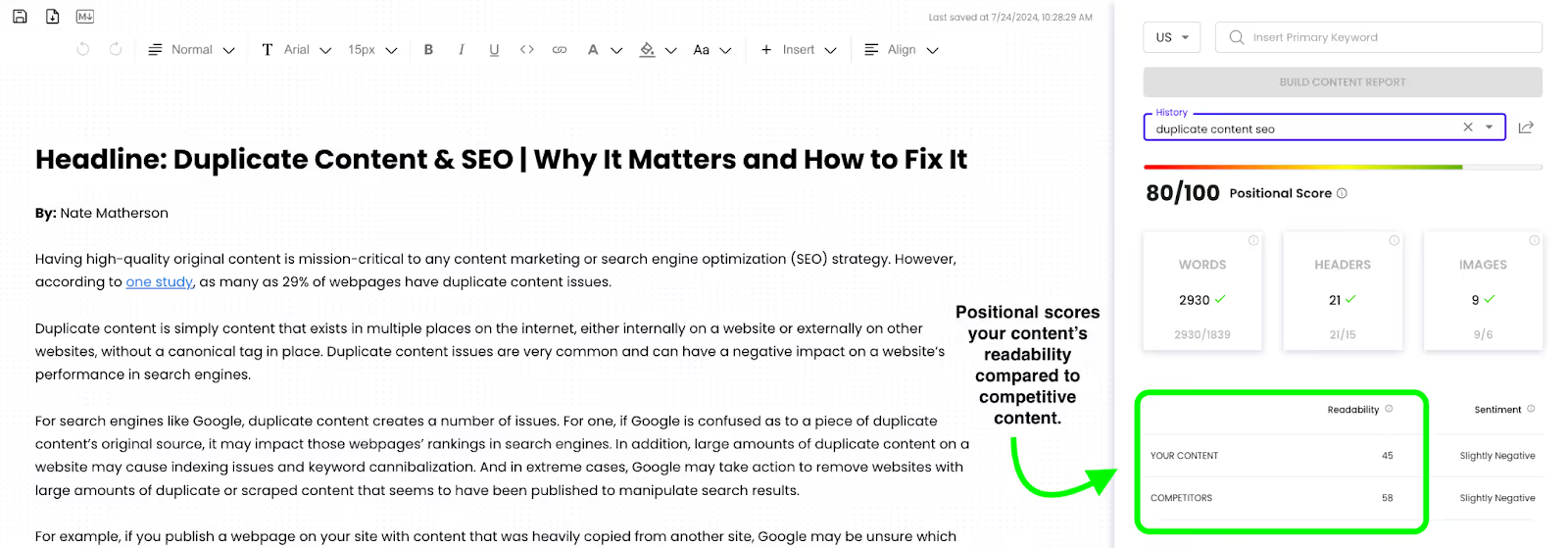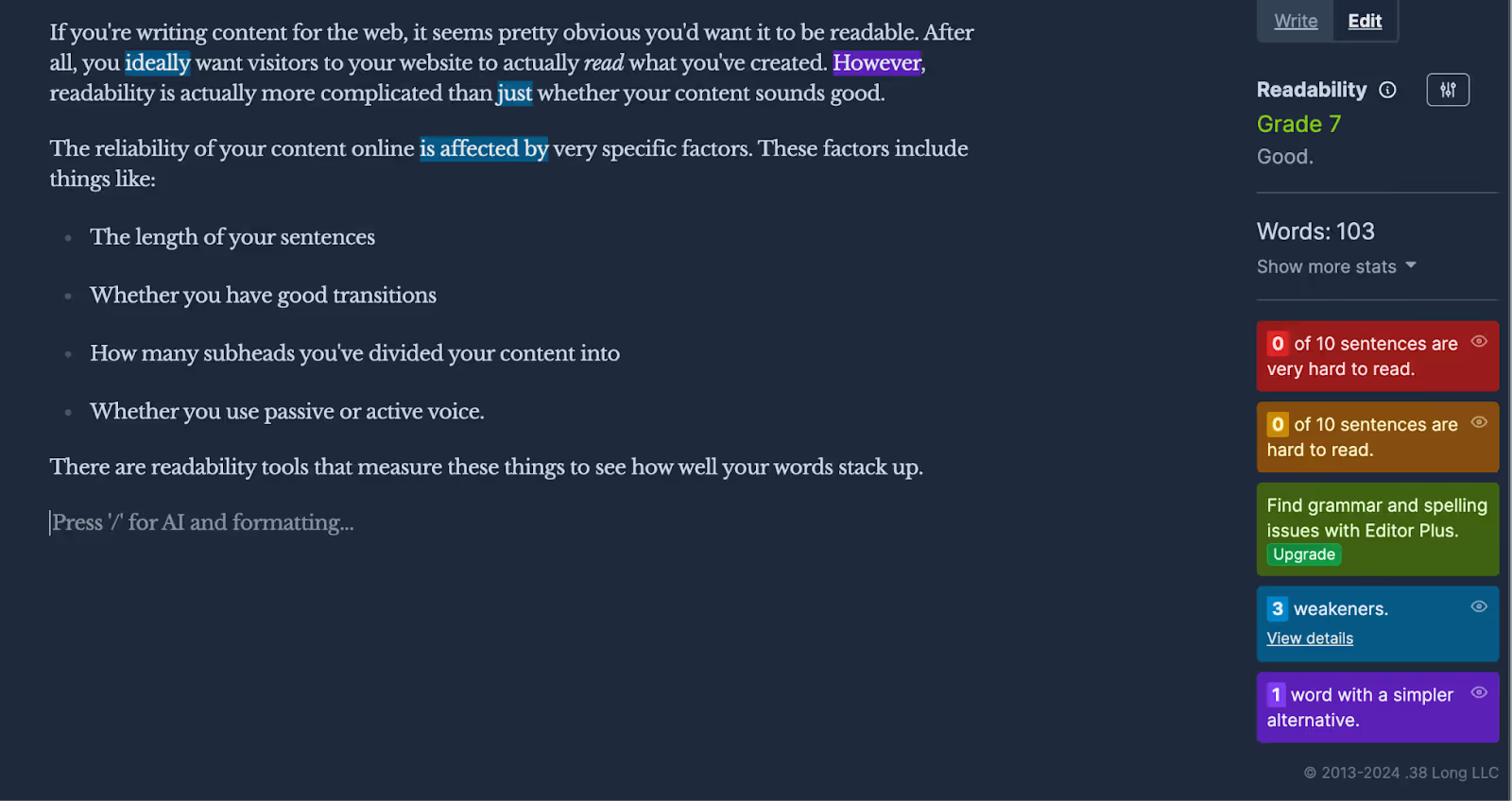If you're writing content for the web, it seems pretty obvious you'd want it to be readable. After all, you want visitors to your website to actually read what you've created. However, readability is actually more complicated than just whether your content sounds good.
The reliability of your content online is affected by very specific factors. These factors include things like:
- The length of your sentences
- Whether you have good transitions
- How many subheads you've divided your content into
- Whether you use passive or active voice.
There are content readability tools that measure these things to see how well your words stack up.
Readability can also indirectly impact your search engine rankings. It's not a direct factor that Google takes into account right now. Still, creating readable -- or unreadable content -- still matters for your SEO strategy. That's because the readability of your content affects how people engage with your writing.
Read on to learn more about the importance of your readability score. You'll also see how to make your content readable, and how to test the readability of your writing.
What Google Has Said About Readability
If you're concerned about how your readability affects your SEO rankings, there's some good news. Google doesn't directly assign you a readability score.
“From an SEO point of view, it’s probably not something that you need to focus on in the sense that, as far as I know, we don’t have kind of the basic algorithms that just count words and try to figure out what the reading level is based on the existing algorithms," John Mueller, a search analyst at Google, explained in a YouTube interview.
This doesn't mean that you can just forget about readability, though. Google did have a readability filter in the past. While it has since been removed, its prior existence suggests the search engine giant absolutely cares about how readable your text is. Google may have just moved to more sophisticated methods of measuring whether users like what you're writing.
Mueller also explained that it's important to figure out readability for your audience so they'll find your content when they search for relevant keywords and so they'll find the content you've written useful once they visit your site.
"It's not a matter of Google.. using the reading level score and saying this is good or bad, but rather does this match what the people are searching for," he explained.
How Readability Could Be Important For SEO
While Google may not be counting your words, content readability can and does affect multiple specific metrics that search engines measure. These are all metrics that we know can affect your SEO performance.
Specifically, Google tracks how people interact with your page. They have many different factors they use to do that including but not limited to:
- Time on page: How long visitors spend on your pages.
- Engagement rate: How long the session lands and whether it contains any conversion events
- Dwell time: The time the user spends on your site before returning to the search engine results page
- Scroll depth: How far readers scroll down on your page
If you produce unreadable content, people are not going to scroll down on your page. They won't stay on your page for any length of time. They won't engage with it by clicking on links or reading it for longer than 10 seconds. They'll go back to the search engine results page quickly and look for content that's easier to consume.
When you perform poorly in all these areas, Google gets the message that you aren't delivering what your visitors are looking for. As a result, your search engine rankings will most likely suffer and so will your website traffic.
Of course, some blogs are always going to be harder to read than others. If you're writing about baking cookies, it's easy to make content readable. It's harder if you're explaining complicated legal or financial concepts. Still, you don't want your readability scores to be worse than our competitors.
Take a look at these two examples of a short blog on personal injury law. See which one you'd be more likely to linger on if you were a casual reader. Both share the same info. But it's easy to see which is more readable. Which will keep you on the page and hit the keywords an accident victim is likely to search for? Which do you think will have higher search engine rankings?
These are extreme examples. Still, they showcase how things like short paragraphs, simple words, and bullet points can affect content readability.
It's a good rule of thumb to make your readability score similar to the readability scores of other pages on similar topics with good SEO rankings. Google has obviously already decided that those pages deliver what readers want.
Earning a good readability score on par with competitors also gives you a pretty good chance of producing content your site visitors will be comfortable consuming.
Of course, making your content readable isn't just important for your SEO strategy. If readers can understand and enjoy your writing, they're much more likely to stay engaged with your site. This means they're ultimately more likely to convert into customers.
Steps to Improve Readability
Knowing readability is important is one thing. Knowing how to make readable content is another. Here are a few things that you should do to make sure your content is as readable as it can be.
Understand Two Key Factors Influencing Readability
There are many different methods of calculating readability and it's important to understand what these tests take into account.
The Flesch–Kincaid readability tests are two common tests that measure reading ease and grade level. Both use equations that consider words per sentence and syllables per word.
Other formulas for readability tests examine similar metrics. For example, the Automated Readability Index takes into account characters per word and words per sentence. The Coleman-Liau test looks at average letters per 100 words, and average sentences per 100 words.
You can research the Kinkaid readability score or many different formulas. You can even look up the specifics online. However, you don't necessarily need to go into the specific equations for purposes of improving readability.
The bottom line is that in pretty much every formula, you're always going to find shorter sentences and shorter words with fewer syllables.
Look Beyond Just Words on the Page
Short words and short sentences are key to most readability formulas. However, they aren't the only thing to improve to create more readable content. Some other techniques include the following:
- Break up your content with headings and subheadings so readers can skim it to find relevant details. The content I've written on this page has many headings and subheadings. Including headings doesn't just make it easier for site visitors to find subjects they're interested in. The headings also help improve your SEO performance, as you can use relevant keywords within the H1s and H2s.
- Space your paragraphs out so readers aren't looking at big walls of text. I try to keep my paragraphs to no more than four lines long when possible. Also, remember that many people will view your content on mobile devices. This can make long paragraphs look even longer.
- Include bullet points to break up your text and make skimming faster. You can see the content I've written here includes many bullet points throughout. These bulleted lists also help me avoid hitting the reader with a wall of text.
- Include pictures and illustrations to improve the reader's experience. Pictures break up the text and can sometimes be the clearest and quickest way to convey information.
- Prioritize the most important details in your writing and cut irrelevant and unnecessary content. Don't make readers to your site read a novel to get the information they're looking for. Most people's attention span isn't that long, especially for web content.
Make Use of Tools to Improve Readability
As I mentioned above, there are many formulas you can use to calculate readability. Most include long equations and would require you to count words and syllables.
You aren't going to do this manually. And you don't have to. Positional, like some other SEO tools, includes a readability score in its optimization tools. This scoring system makes it easy to see how the readability or your content compares to other top-ranking content. Positional's tool uses the Flesch-Kincaid formula.
You can see the readability score for this piece in the screenshot below. As you can see, you'll get a numerical score and see the numerical scores of other top-ranking pages.

There are also a number of different tools you can use to make writing readable content easier. Here are two that I use regularly:
- Grammarly. Grammarly highlights hard-to-read sentences and problems like passive voice. The tool suggests ways to improve them.
- Hemingway. This assigns you a readability score based on sentence structure and other factors. It also offers suggestions for rewriting difficult sentences to create more readable content.
Here's a screenshot of Grammary's content writing tool, and the suggestion it made for the content I wrote.

Here is a screenshot of the Hemingway app. It shows the tools it uses to measure readability. It also shows the suggestions it makes to improve it.

These automated tools can go a long way toward making your content more reader-friendly. However, there's no substitute for expert advice. If you have the budget, hiring a copy editor can also be a great investment. A skilled editor can do wonders with polishing and improving your writing.
Final Thoughts
Since readability can directly affect the user experience and indirectly affect your Google rankings, it's definitely worth considering as you write. Remember:
- Keep those sentences short
- Avoid long words
- Make your content skimmable
- Use the SEO tools necessary to create great content that people actually want to read.
Your efforts will pay off when people engage with your content for longer, your SEO performance improves, and you hopefully convert more website visitors into customers.





